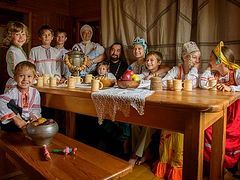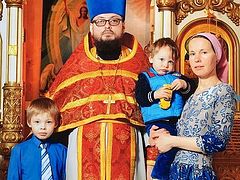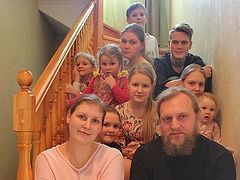Fr. Nikolai Erak’s family lived in Siberia before they moved to Rybinsk [the second largest city in Russia’s Yaroslavl region at the confluence of the Volga and Sheksna Rivers.—Trans.]. These parents of nine children have gained very interesting experience by comparing the attitudes of society towards large families in different parts of Russia. According to them, external hardships helped them make a truly strong family.
Priest Nikolai Erak, forty-seven, the rector of the Church of St. Seraphim of Vyritsa in the city of Rybinsk.
Tatiana, forty-three, a physics teacher.
They have been married for eighteen years.
Their children:
-
Ivan, seventeen, a student of the Rybinsk Aviation College;
-
Ekaterina, fifteen, a ninth grader of the Orthodox school in Rybinsk;
-
Pyotr, fourteen, an eighth grader of the same school;
-
Nikolai, thirteen, a seventh grader;
-
Maria, eleven, a fifth grader;
-
Anna, eight, a second grader;
-
Fyodor, six;
-
Elizaveta, three;
-
Seraphim, four months.
Fr. Nikolai speaks:
My wife and I were brought together by the Lord—I was shown a clear sign from above. But I wouldn’t like to reveal the details here because it is very personal. We studied at the same theological school in Omsk [a city in western Siberia, on the River Irtysh.—Trans.]. I proposed to her. We had a very modest wedding ceremony in church.
It so happened that at the very beginning of our family life, when husbands and wives usually adapt to one another, we had frequent conflicts—not with each other but with our parents. It helped my wife and me become closer: we are believers, while they are not. I was ordained very soon after our wedding, whereas Tatiana’s mother was opposed to that and kept scolding her daughter for her “unfortunate” marriage. We would support one another, and this mutual support really united us.
Of course, it was rather difficult for us to be under constant pressure from our parents. But after the birth of our second child, by divine Providence I was assigned to a rural parish. Over the seven years of our life in the village we were blessed with four more children. If it had had happened in Omsk under our parents’ very eyes, it would have been a nightmare. Beginning from the third child they would have rebuked us all the time for our “wrong” way of life. They had been brought up in the 1960s when an average family had one child and everybody was “building socialism”. A family with many children was considered an unhappy one. My wife’s mother called her own daughter a “sponger”: “You only sit at home idly, do nothing, and have no job!”
People around us perceived us differently. It was harder in Siberia, but after moving to Rybinsk we breathed a sigh of relief: in European Russia the attitude towards large families is better. You could feel this in social service agencies in particular. There are few families with many children in Siberia, even among clergy. After visiting the local social service agency in Omsk for the first time my wife said, “I won’t go there again!” Seeing her for the first time, they immediately accused her of all the mortal sins. So I went there from that time on. But here, in Rybinsk, people are well disposed to us both at the social service agency and in the street. People have a very different mentality.
I had always dreamed of becoming a father of many children. I wanted to have seven children. My parents had four children, and I was the youngest. The first two girls were much older than I, they grew up and left, and I lived with my third sister. From my earliest years I formed the conviction that having one child is like having no children, two children are like half a child, and three children are like one child. I didn’t understand this fully until I had to wake up every night to feed our third baby, Pyotr. Ekaterina was still a newborn, so my wife nursed her, while I would get up at night to feed Pyotr. It was then that I realized that three children were equivalent to one child. And after the fifth child it doesn’t really matter how many children you have. When all the children were small, it was hard for us to manage. Once the older children have grown up, they sit with the youngest one and are involved in some of the household chores. As soon as the children turn twelve, your life becomes a little bit easier.
In bringing up children we try to keep to the golden mean. After all, the Lord waits for us to improve for a long time before punishing us. So do we. True, we are not always patient enough, but we nevertheless don’t punish our little ones often. We may do so if they quarrel a lot with each other, if our oldest son smells like smoke, or if the children lie. But a little naughtiness doesn’t deserve punishment.
It is impossible to avoid conflicts between children. We live in a three-room apartment and occasional petty squabbles are inevitable. One child wants something, while another child wants the same—and there is a quarrel. Meanwhile I cannot recall any instance when our children had a fight. Crowded, but not aggrieved, as the saying goes. When three of our children went to a children’s camp, I felt really uncomfortable—when three of your loved ones are away, you feel incompleteness. My wife and I are used to being surrounded by the little ones all the time. Perhaps in our old age we will be able to stay alone for some time, though perhaps we won’t. Now we have been given some land to lease; God willing, we will begin building a house this year.
Spouses may have various temptations. Non-believers don’t understand that these are tricks of the evil one, that the thoughts and feelings that appear in our minds and hearts are often not ours. It is easier for us believers, because we do have demonic attacks, but then they abate. It is very important to be frank with each other. My wife and I have never even had a serious argument. Though sometimes I would grumble at my wife or she grumbled at me. But whenever I would be grumbling, the Lord would give my wife an amiable frame of mind, so she would be silent and even smiling; and whenever my wife is grumbling, the Lord gives me a good mood. Why return her annoyance, if I see that she is under attack? I should wait and have patience. After all, we are one flesh. We must be able to forgive.
We don’t force our children to go to church. Our oldest son takes Communion, though seldom, and attends a Sunday school at the church that he likes. Though he doesn’t go to services, at least he attends the Sunday school—and glory be to God. We pray for him; I understand that he wants to make decisions independently. The other children still don’t have that desire. And, nevertheless, he and his friend went to church on Pascha with us, confessed and took Communion. They also took one girl with them, who confessed and received Communion as well. Although teenagers play pranks and can be obstinate, the seed of frequent Communion sown in their souls from infancy will live in them forever.
Tatiana speaks:
I got married at the age of twenty-five. I worked in a school and went to church. I was the only church-goer in my family—my other family members were not religious. But I had some important questions and could only find the answers in Orthodoxy. Moreover, I was a fatherless child. My mother was a successful person, she worked as an engineer at a factory; but a lack of happiness affected her character. And I saw absolutely different families at church—those people were filled with other emotions and other meaning. They were united not by material bonds but by something else. As I looked at them I thought: “I want to live my life the same way.” The Lord answered my prayer—Fr. Nikolai proposed, and I said yes at once.
My parents were opposed to me marrying a future priest.
A successful girl who studied well, graduated from a university, and had a job… like a bolt from the blue began to go to church and then became a priest’s wife! I understand them perfectly well: their daughter started living counter to their deep-rooted idea of a “proper” life. It is hard to understand and accept this. But as Fr. Nikolai rightly said, this lack of understanding in the family consolidated us and helped us know each other better. We had hardly ever communicated before our wedding in church. One day I had seen a young man coming out of the altar and thought: “I would like to marry a young man like him.” Soon Fr. Nikolai asked for my hand.
I was not at all prepared to become a mother of many children. I was an only child. It so happened that even in my girlhood I communicated with childless priests’ families. And despite that, I took each of our children as a given, without any reflection. Sometimes people ask me: “Do you really want to change diapers again?” Yes, it is very hard to shoulder this heavy burden and deny yourself almost everything. After the birth of my last baby I didn’t leave home for two months. But I do not have words to describe the feeling the Lord has sent into my heart. And this feeling helps me overcome all the hardships.
In my view, there is a hidden lack of well-being in women’s disinclination to have children. They may have uneasy relations with their husbands or are afraid of being judged by others. When we lived in Omsk, there were very few large families there. When you go out into the yard with five children with one year difference of age between them, very exhausted, people start to gaze at you intently and sum you up, and say a lot of negative things to you. For them a large family is associated with a problem family. People always asked me: “What is your education level?” There are considerably more large families in Rybinsk, and the social service and hospital staff are more friendly. And people don’t ask puzzling questions in the streets. One day we went to visit someone in Kurgan [a large city on the River Tobol in the south of the West Siberian Plain.—Trans.], and whenever I went outside with my children, strangers would bombard me with questions, like: “Where are you from? How can it be?!” I got the impression that people don’t have children in this city. I like reading interviews with parents of large families to relieve myself from any inward panic and say to myself: “I am like everybody else, I am normal.” Because everybody around me keeps saying that I am crazy, that something is wrong with me, since I have so many children! So the story of every large family is like a gulp of fresh air for me.
Curiously enough, outward problems are instrumental in maintaining a close bond between husband and wife. Assume there is some discomfort caused by financial problems or other people… Once someone has spoken of your husband badly, you begin to defend him. And this unites you. And the spouses must communicate. As soon as you begin to hold something back, problems will emerge. Once you have had a heart-to-heart talk, they are over. We are all humans, we all can have inner discontent, and you should talk about it. Not in the form of complaints, but quietly and constructively. All the more so if you are a mother who spends most of her time at home with her children and her husband is her main listener and partner in conversation.
But the main things that unite the spouses are the faith and the Church.










